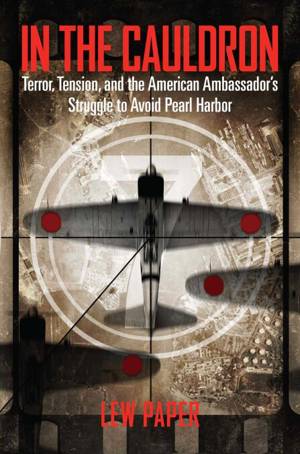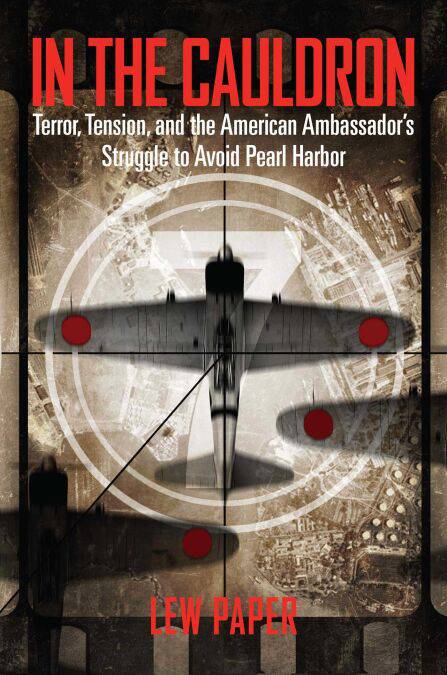
- Retrait en 2 heures
- Assortiment impressionnant
- Paiement sécurisé
- Toujours un magasin près de chez vous
- Retrait gratuit dans votre magasin Club
- 7.000.0000 titres dans notre catalogue
- Payer en toute sécurité
- Toujours un magasin près de chez vous
In the Cauldron EBOOK
Terror, Tension, and the American Ambassador's Struggle to Avoid Pearl Harbor
Lew Paper
Ebook | Anglais
14,53 €
+ 14 points
Description
“The underbrush through which Mr. Paper cuts his way . . . would be challenging for any writer. But Mr. Paper, with an eye for character and an easy narrative style, manages to keep his subject interesting. . . . And even though we know how it’s all going to end, Mr. Paper manages to add a measure of suspense to his narrative — a tribute to his abilities as a writer.” —The Washington Times
This is not just another book about Pearl Harbor. It is the story of Joseph Grew, America’s ambassador to Japan, and his frantic effort in the months before the Pearl Harbor attack to orchestrate an agreement between Japan and the United States to avoid the war he saw coming. It is a story filled with hope and heartache, with complex and fascinating characters, and with a drama befitting the momentous decisions at stake.
And more than that, it is a story that has never been told.
In those months before the Pearl Harbor attack, Japan and the United States were locked in a battle of wills. President Franklin D. Roosevelt's economic sanctions were crippling Japan. America's noose was tightening around Japan's neck — but the country's leaders refused to yield to American demands.
In this cauldron of boiling tensions, Joseph Grew offered many recommendations to break the deadlock. Having resided and worked in Tokyo for almost ten years, Grew understood what Roosevelt and his administration back home did not: that the Japanese would rather face annihilation than endure the humiliation of surrendering to American pressure.
The President and his administration saw little need to accept their ambassador’s recommendations. The administration’s policies, they believed, were sure to succeed. And so, with increasing urgency, Grew tried to explain to the President and his administration that Japan’s mindset could not be gauged by Western standards of logic and that the administration’s policies could lead Japan to embark on a suicidal war with the United States “with dangerous and dramatic suddenness.”
Relying on Grew’s diaries, letters and memos, interviews with members of the families of Grew and his staff, and an abundance of other primary source materials, Lew Paper presents the gripping story of Grew’s effort to halt the downward spiral of Japan’s relations with the United States. Grew had to wrestle with an American government that would not listen to him – and simultaneously confront an increasingly hostile environment in Japan, where pervasive surveillance, arbitrary arrest, and even unspeakable torture by Japan's secret police were constant threats.
In the Cauldron reads like a novel, but it is based on fact. And it is sure to raise questions whether the Pearl Harbor attack could have been avoided.
This is not just another book about Pearl Harbor. It is the story of Joseph Grew, America’s ambassador to Japan, and his frantic effort in the months before the Pearl Harbor attack to orchestrate an agreement between Japan and the United States to avoid the war he saw coming. It is a story filled with hope and heartache, with complex and fascinating characters, and with a drama befitting the momentous decisions at stake.
And more than that, it is a story that has never been told.
In those months before the Pearl Harbor attack, Japan and the United States were locked in a battle of wills. President Franklin D. Roosevelt's economic sanctions were crippling Japan. America's noose was tightening around Japan's neck — but the country's leaders refused to yield to American demands.
In this cauldron of boiling tensions, Joseph Grew offered many recommendations to break the deadlock. Having resided and worked in Tokyo for almost ten years, Grew understood what Roosevelt and his administration back home did not: that the Japanese would rather face annihilation than endure the humiliation of surrendering to American pressure.
The President and his administration saw little need to accept their ambassador’s recommendations. The administration’s policies, they believed, were sure to succeed. And so, with increasing urgency, Grew tried to explain to the President and his administration that Japan’s mindset could not be gauged by Western standards of logic and that the administration’s policies could lead Japan to embark on a suicidal war with the United States “with dangerous and dramatic suddenness.”
Relying on Grew’s diaries, letters and memos, interviews with members of the families of Grew and his staff, and an abundance of other primary source materials, Lew Paper presents the gripping story of Grew’s effort to halt the downward spiral of Japan’s relations with the United States. Grew had to wrestle with an American government that would not listen to him – and simultaneously confront an increasingly hostile environment in Japan, where pervasive surveillance, arbitrary arrest, and even unspeakable torture by Japan's secret police were constant threats.
In the Cauldron reads like a novel, but it is based on fact. And it is sure to raise questions whether the Pearl Harbor attack could have been avoided.
Spécifications
Parties prenantes
- Auteur(s) :
- Editeur:
Contenu
- Nombre de pages :
- 454
- Langue:
- Anglais
Caractéristiques
- EAN:
- 9781621578970
- Date de parution :
- 04-11-19
- Format:
- Ebook
- Protection digitale:
- Adobe DRM
- Format numérique:
- ePub

Seulement chez Librairie Club
+ 14 points sur votre carte client de Librairie Club
Les avis
Nous publions uniquement les avis qui respectent les conditions requises. Consultez nos conditions pour les avis.







